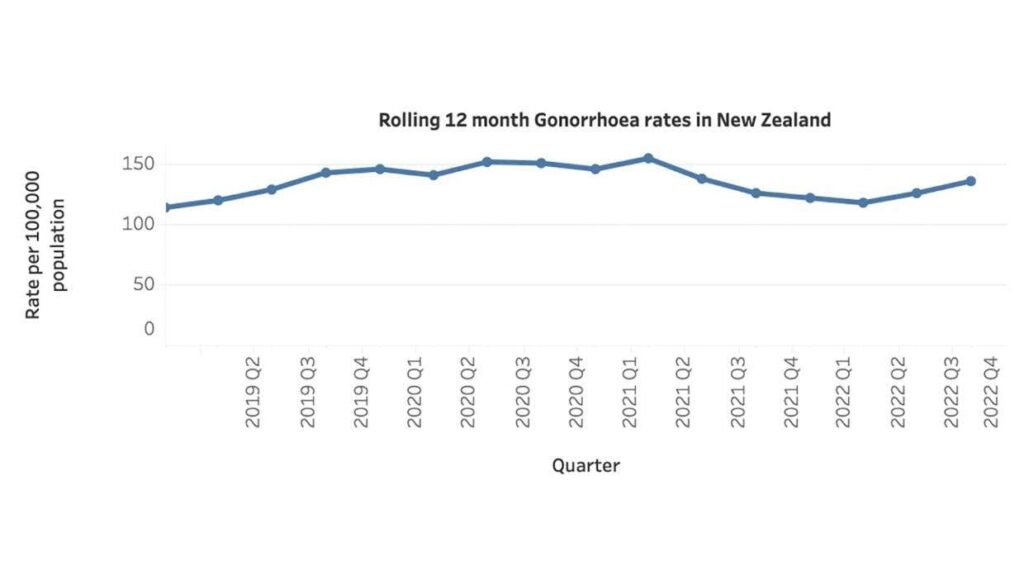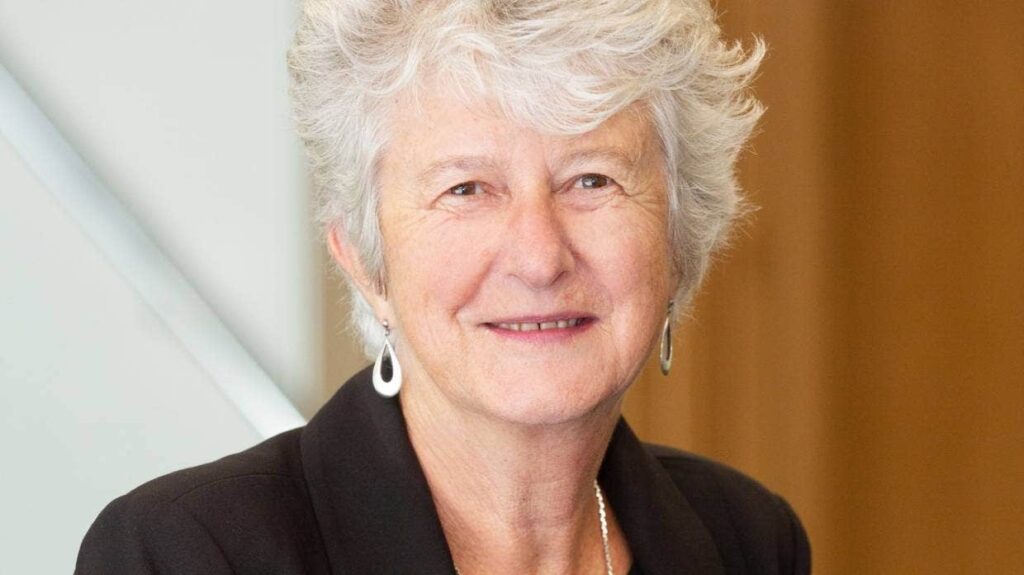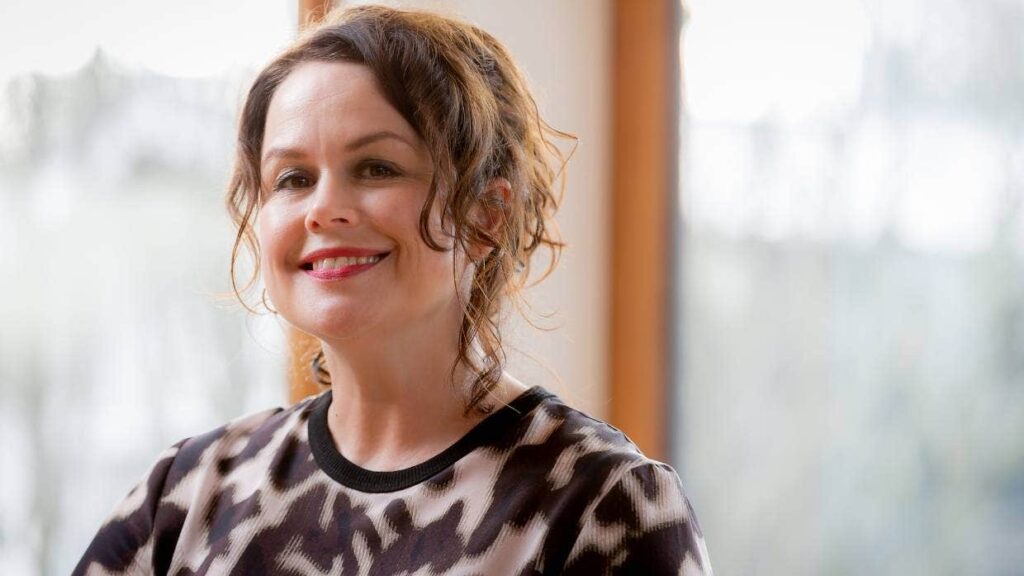by Annemarie Quill
First published on Stuff 05:25, May 03 2023

Gonorrhoea can be spread by kissing without any sexual activity, experts say (file photo).
A sexually transmitted disease on the rise in Aotearoa, commonly referred to as ‘the clap’, can be caught from kissing, shared towels and even flies.
And government health advice, which says it can only be transmitted via sexual activity, needs to be updated, experts say.
Gonorrhoea is a sexually transmitted infection caused by the bacterium Neisseria gonorrhoeae, and can infect the genitals, rectum and throat.
However, it’s not currently considered to be a kissing disease.
Health advice in New Zealand says gonorrhoea is spread through skin contact during sex, and oral gonorrhoea spread via oral sex, according to information published on the Ministry of Health website.
The Ministry of Health advises that you can protect yourself from gonorrhoea by using a condom when having sex, but this advice is being challenged by Australian research suggesting it can also be spread by kissing without having sex, and New Zealand experts who say it can be spread by towels and flies.
A Melbourne university report, published by the American Sexually Transmitted Disease assocation in February, said the message that gonorrhoea could be transmitted through tongue kissing needed to be reinforced to help prevent the spread of the disease.
This message challenges the accepted traditional transmission routes of gonorrhoea held for the past 100 years, in which genital or oral sex was thought the only route.
Rises in sexually transmitted diseases were due to multiple factors, that included testing and sexual health education, one of the researchers of the study, associate professor Eric Chow said in an interview.

Associate Professor Eric Chow, Melbourne Sexual Health Centre, says there were multiple reasons why some sexually transmitted diseases were on the rise.
Chow and fellow researchers have undertaken five studies on gonorrhoea and found an association between kissing and oropharyngeal gonorrhoea, although there is currently no routine throat swabbing for the disease.
“Our work has found that heterosexual individuals who reported sexual contact with partners with gonorrhoea had high gonorrhoea positivity in the throat, and some individuals only had throat gonorrhoea but not urogenital gonorrhoea,” said Chow.
This indicated that cases of the disease may be being missed and spread further to others.
“Urogenital testing for gonorrhoea among this group may not be sufficient, and some throat infections might have been missed and lead to further transmission. Clinicians should also consider testing throat gonorrhoea among heterosexuals who reported sexual contact with partners with gonorrhoea.

Rolling 12 month gonorrhoea rates in New Zealand.
Vaccinologist and associate professor at the University of Auckland, Helen Petousis-Harris, who is involved in the development of a vaccine against the disease, said there’s “no surprises” that it can be spread by kissing without actually having sex.
“The idea that it can only be sexually transmitted is rubbish, the bacterium can remain viable for days outside the body in the right conditions.”
There are even historical examples of outbreaks in orphanages from contaminated towels, and also person to person by flies landing on mucosal membranes, she said.
“People can have it in their eyes, so if a fly lands near the eye like they do in the summer, it could be spread that way, or if an infected person wipes their eyes on a towel or any object.”
Although sexual transmission may be the main form, government advice could be updated so more people are educated that it is not the only way, she said.
Auckland university professor Felicity Goodyear-Smith, a doctor and forensic physician in sexual assault allegations went further and said that not only public health guidelines need to be updated, but also child sexual abuse guidelines.
“Adults need to be aware that it can be spread other ways as most people would think it is only by sexual activity. You could say kissing is sexual activity, but it needs to be clear it can be spread without penile contact.”

Felicity Goodyear-Smith, Auckland University professor, doctor and forensic medical adviser.
Her research on non-sexual transmission of gonorrhea which states that it can be transmitted by communal baths, towels or fabric, rectal thermometers and caregivers hands, has attracted controversy, as the belief that it can only transmitted by sexual contact is so ingrained.
“In child sex abuse cases, where a child in a household where adults have gonorrhoea also gets it, there should not be an automatic assumption that sexual abuse has taken place … while all paediatric cases of gonorrhoea must be investigated seriously, forensic medical examiners should keep an open mind about possible means of transmission.”
Goodyear-Smith is this week heading to London as a defence expert in the trial of a father whose four-year-old got gonorrhoea after the parents did, to give evidence about transmission other than sexual contact.
She also worked on a New Zealand case of a 13-month old baby with infected parents who denied sexual abuse but admitted to sharing their bed, bath and towels with their infant.
“Guidelines definitely need updating so that people can be aware of hygiene issues. This was a young family of low socio-economic circumstances living in a crowded housing situation. The mother would use her sarong as a nappy on occasions.”

Tania Domett, Project Gender researcher.
Project Gender researcher Tania Domett, who recently conducted a survey about sex and online dating apps, said ministry health advice about sexual health needed to be updated.
“Our research found that there is an urgent need for an awareness campaign about sexual health, particularly for the over-50s.”
The survey found that New Zealanders were disregarding official health advice on using STI protection and were putting themselves at risk.
“Many are coming out of long relationships, and it’s been a long time since they were last “dating” or they no longer require protection from unwanted pregnancy. Quite frankly, they feel like advice around using condoms simply doesn’t apply to them, and that they’re bulletproof,” said Domett.
Gonorrhoea rates in New Zealand increased in the last two quarters of 2022, according to data collated by the Institute of Environment Science and Research (ESR).
Gonorrhoea disproportionately affected people aged 20 to 29, and more males than females, according to ESR.
Regions with the highest rise in cases included the Lakes, Bay of Plenty and Mid Central districts.